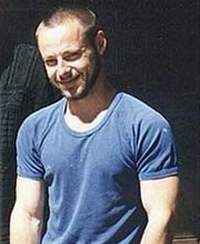David Hicks to be returned to Australia to serve prison term for helping al-Qaida
David Hicks, an Australian detainee who pleaded guilty to helping al-Qaida conduct terrorist activities against the United States is likely to be returned to Australia where he would serve his sentence by the end of the year.

Hicks, a 31-year-old former kangaroo skinner, entered the surprise plea Monday at the first session of new military tribunals that the Pentagon set up after the U.S. Supreme Court found its previous efforts to try Guantanamo prisoners unconstitutional.
Wearing a tan prison jumpsuit with long, thinning hair past his shoulders, Hicks appeared focused as his Pentagon-appointed attorney told the judge that his client was pleading guilty to one of two counts of providing material support for terrorism. Asked by the judge if this was correct, Hicks said solemnly, "Yes, sir."
Members of a military panel convened for the Australian's case are expected to travel to the U.S. Naval base in southeast Cuba to determine the sentence for Hicks, the first of hundreds of Guantanamo detainees to plead guilty since the first terror suspects were brought here in 2002.
"If I was a betting man, I'd say the odds are good" that Hicks will be home by the end of the year, Air Force Col. Morris Davis, the chief prosecutor for the Guantanamo tribunals, told reporters after Hicks entered his plea.
Despairing that he could not receive a fair trial at Guantanamo, Hicks had been considering a plea bargain to end his five-year imprisonment, according to his lawyers. Once the plea was announced, attorneys said a gag order by the military judge prevented them from discussing details.
The United States has agreed to let Hicks serve any sentence in Australia.
"This is the first step toward David returning to Australia," said David McLeod, an Australian attorney for Hicks.
Hicks, a Muslim convert, allegedly attended al-Qaida camps in Afghanistan, conducting surveillance on the British and American embassies as part of his training. But he remained on the margins once the U.S. invaded to oust the Taliban following the Sept. 11 attacks. He eventually joined al-Qaida fighters hours before the front lines collapsed and was captured as he tried to flee, according to the U.S. military.
The count he pleaded guilty to says he intentionally provided support to a terror organization involved in hostilities against the United States. He denied the charge that he provided support for an act of terrorism.
The charge he admitted carries a maximum penalty of life in prison, but Davis has said he would seek a sentence of about 20 years. He said the five years Hicks has spent at Guantanamo could be considered in the ultimate sentence.
In Australia, Foreign Minister Alexander Downer said he expected Hicks would return soon to Australia, where an outcry over his continued detention has costPrime Minister John Howard support ahead of elections due this year.
"I am pleased for everybody's sake that this saga ... has come to a conclusion," Downer told Australian Broadcasting Corp. radio.
But Sen. Bob Brown, leader of the minor opposition Greens party, said Hicks made the plea so he could get out of Guantanamo Bay and his guilt would remain in doubt.
"He's pleaded guilty but under circumstances that wouldn't hold up in an Australian court and that debate will fly home with Hicks," Brown said.
Hicks entered the plea at an unscheduled, evening court session after initially reserving his plea at a dramatic daytime hearing that critics described as a revealing test of the revised tribunal system, which was approved last year by the U.S. Congress.
Hicks asked for more lawyers to help defend him, but the judge, Marine Corps. Col. Ralph Kohlmann, instead ordered two civilian attorneys to leave the defense table, leaving the defendant with one attorney.
"I think the events earlier today - although the Hicks case looks like it will conclude - proves that this process is not yet ready for prime time," said Neal Sonnett, an American Bar Association observer at the tribunals. "It needs substantial work. There needs to clarification of the rules."
One of the civilian lawyers, Joshua Dratel, said he refused to sign an agreement to abide by tribunal rules because he was concerned the provisions did not allow him to meet with his client in private.
"I'm shocked because I just lost another lawyer," Hicks said after Dratel's departure, drawing a scolding from the judge for interrupting as he explained the reasoning for removing the lawyers.
Hicks' military attorney, Marine Corps Maj. Michael Mori, challenged Kohlmann's impartiality, arguing that his participation in the previous round of military trials that the Supreme Court last year found to be illegal created the appearance of bias, the AP reports.
A challenge of the reconstituted tribunal system is pending before the Supreme Court. Lawyers for detainees have asked the high court to step in again and guarantee that the prisoners can challenge their confinement in U.S. courts.
Lawmakers have also questioned the detainees' lack of access to U.S. courts.
Kohlmann, wearing a black robe over his uniform, ordered attorneys to attend a closed session Tuesday in a hilltop courthouse at Guantanamo to specify the acts to which Hicks is pleading guilty. The judge will also make sure Hicks understands the consequences of the plea, officials said.
Terry Hicks had an emotional reunion with his son before the arraignment Monday. But he already had boarded a plane to leave Guantanamo when he was told an evening session would be held and was not in the courtroom when his son entered his pleas.
Subscribe to Pravda.Ru Telegram channel, Facebook, RSS!





